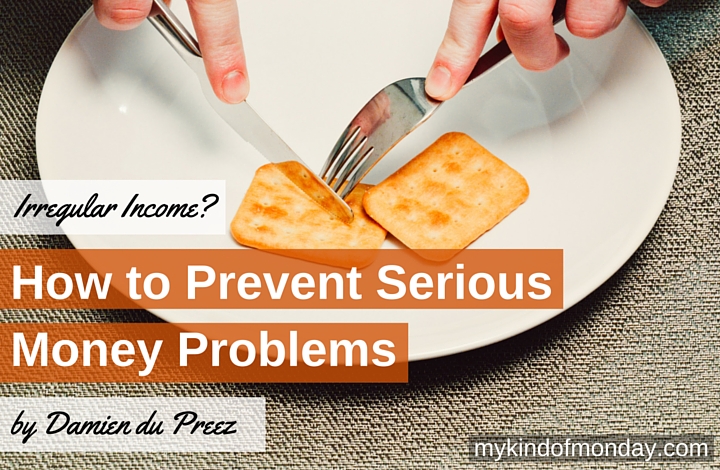
I’m a freelance writer, and like many others I know all about the problems that come from an irregular or uneven income. Clients ditch you, payments are late and you’re left with unpaid bills and not enough money for milk.
This whole repetitive system sucks, but it’s surprisingly easy to get out of.
Your escape is called an emergency fund, and here’s how it will help even out your income and ensure you have enough money every single month.
While I may be a freelance writer, what follows will be invaluable to anyone with an irregular or uneven income. So listen up, folks!
What is an emergency fund?
An emergency fund is exactly what it sounds like – a savings account you create and deposit money into, only to be withdrawn from in the event of a serious cash-flow emergency. Like being unable to pay your rent, for instance.
Regardless of how you run your freelancing business, your emergency fund should never be linked to one of your personal bank accounts. This makes it way too easy to dip into it. I personally keep it as one of my business’ bank accounts, but you could also open up a new account with a different bank.
The whole point of an emergency fund is to give you money when you need it, for instance: if you need to earn, at minimum, $5,000 per month but you’ve only earned $3,500 this month you can withdraw the remaining $1,500 from your emergency fund and be right as rain.
When previously you would have panicked and had to seriously cut down on expenses, you can now rest easy because you’ve built yourself a comfortable buffer. A buffer made out of money, that is.
But how much do you need in an emergency fund to live in absolute security?
How big should your emergency fund be?
No matter how large your emergency fund there’s always a financial risk inherent in being a freelancer – it comes with the territory. But, odds are if you’re responsible enough with your fund you can bring the risk down to a more comfortable level.
I would recommend building your fund up to the exact value of 12 months’ worth of expenses, although some people are comfortable with 6 months. I’m not.
If you’re average monthly expenses amount to $5,000, your fund (at optimal value) should be around $60,000.
But $60,000 is a whole bunch of money and you’re probably wondering why it needs to be so much. Well, the bigger your fund the less risk there is and the more assurance you’re giving yourself that you’ll be able to meet your expenses each month, regardless of what happens.
You don’t have to have a fund so big, of course, especially if your expenses are a lot less than $5,000 a month. But the smart money’s on a lot of money, especially in our sometimes-risky line of work.
How to build up your emergency fund

While this kind of buffer sounds absolutely awesome to have on a rainy day it does take a lot of work, and in some cases sacrifice, to give yourself that kind of financial safety.
The first step to actually building up your emergency fund is to open an account for it. Like I said earlier, don’t link it to your personal accounts.
I don’t recommend any long-term savings accounts, even the 30-day notice ones, because they’ll just be a burden once you inevitably need some money in a hurry. Remember: we’re not starting an investment; we’re creating a safety buffer.
Now, when it comes to actually putting money into your fund and building its balance you have two options:
- Deposit a fixed amount each month into the account (if you can afford it)
Depositing into your Emergency Fund should become an expense. This way, provided you have the money after necessities like food, you’re always contributing a fixed amount to your financial security.
The exact amount of the deposit depends on how quickly you want to build your fund and get that mega-buffer in place.
- Deposit whatever’s left after expenses and ‘fun money’
This is, in my opinion, a more risky approach to building up your fund, but it works if it isn’t a very high priority for you (though it should be).
If your expenses this month are $5,000 and you set aside $1,000 to have fun with, but you earned $7,000 in total, you deposit the remaining balance into your fund.
The problem comes in when you don’t earn so well, or when you ‘don’t feel like depositing as much money this month’. Making your emergency fund deposit a necessary expense is the smartest way to go, but it’s ultimately up to you.
The most important part is actually having a fund in the first place.
My fund is at optimal value. Do I stop depositing?
Well done! You’ve done so much better than the 28% of Americans who have nothing in their savings accounts.
But just because you’re fund is at optimal value (12 months’ worth of expenses) doesn’t mean you should stop. Expenses are always going up and so if you haven’t been increasing your deposits to match rising expenses your ‘optimal value’ won’t actually be relevant after around 6 months of saving.
Once you have a healthy amount in the bank you can decrease the value of your deposits or only deposit every 2nd month (for instance), but you should always be adding to your fund a little bit, just in case.
Other income-evening techniques
Having an emergency fund is fantastic, but there are ways you can even out your income so you very rarely (if ever) have to make use of it.
- Be put on retainer
No matter which freelancing field you’re in there are always opportunities to be put on retainer. Talk to your most regular clients and see what they think.
Getting a fixed amount of cash each month is a lot better than random payments here and there.
- Diversify your services
While sticking to your freelancing niche may make you a more valuable freelancer, it could also cause serious trouble if your niche suddenly disappears (I’m looking at you, SEO).
I write blog posts and webcopy, but I’m thinking of diversifying even further and creating a few online courses. Not only is diversifying good financial sense, it’s also fun to try out new things.
Good luck!
People, the financial hazards of a freelancing career are real, but they don’t have to be scary. Put an emergency fund together and be careful (and smart) with your money.
We don’t earn the same way desk-jockeys do and therefore we can’t treat our money the same way. Life’s so much better when money isn’t a stressful concept, so do everything you can to give yourself that extra security.
Author Bio:
 Damien du Preez is a rebellious freelance copywriter and blogger operating out of Cape Town, South Africa. He helps out wannabee freelance writers at ReleaseChaos.com, as well as providing his kickass clients with blogs posts and webcopy that frequently cause involuntary eye-gasms. Follow him on Twitter as @DamienJDP.
Damien du Preez is a rebellious freelance copywriter and blogger operating out of Cape Town, South Africa. He helps out wannabee freelance writers at ReleaseChaos.com, as well as providing his kickass clients with blogs posts and webcopy that frequently cause involuntary eye-gasms. Follow him on Twitter as @DamienJDP.
Leave a Reply